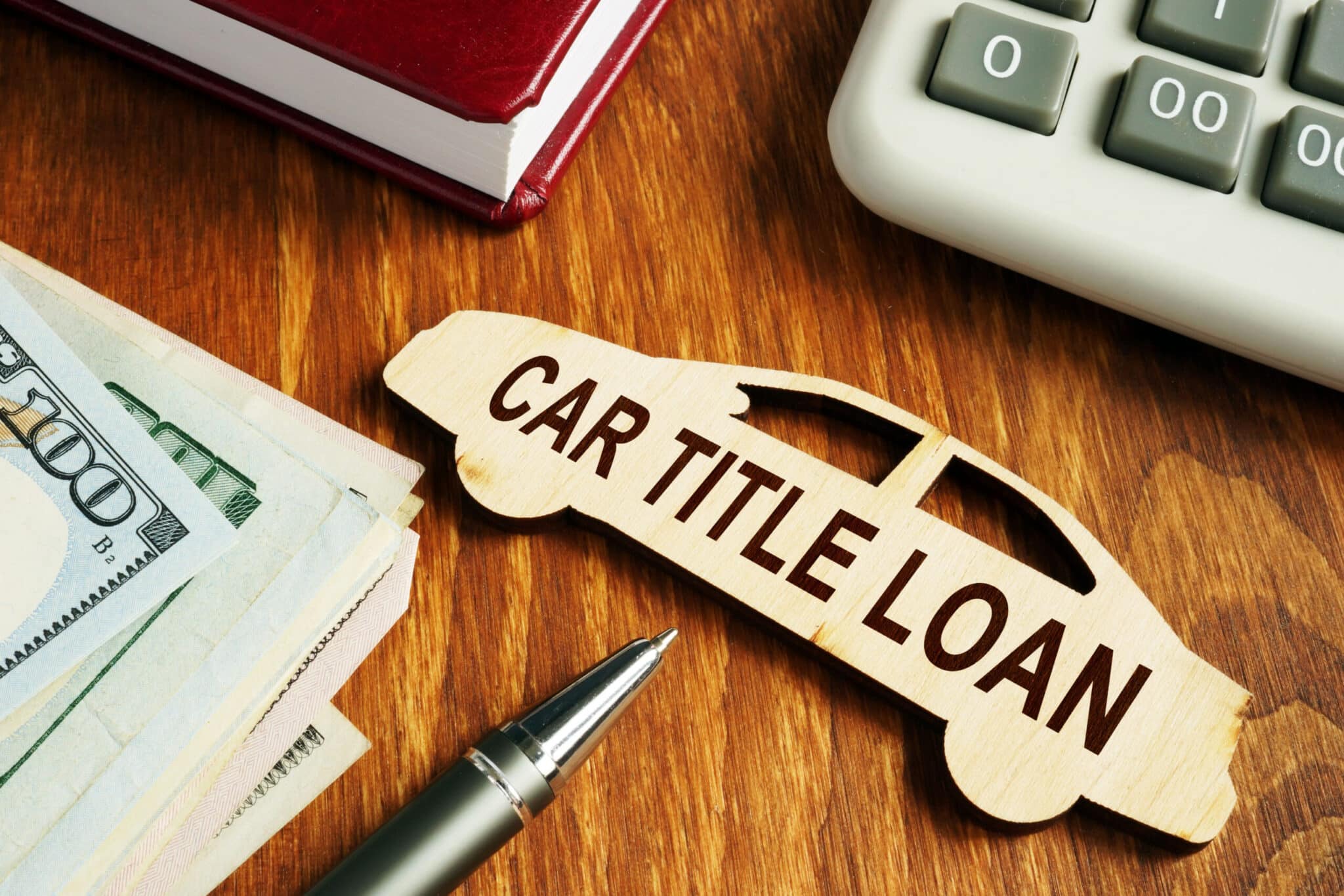Title loans offer a quick and easy solution for those in need of emergency financial aid. But how do title loans work exactly?
As someone who has gone through the title loan process, I know how confusing and overwhelming it can be. But don’t worry – I’m here to break down all the details, so you understand exactly how title loans work.
In this article, I’ll discuss the basics of a title loan, so you can determine if this type of loan is the right fit for your needs.
What is a Title Loan?
First, let’s start with understanding what a title loan is.
A title loan is a high-interest secured loan where you (the borrower) agree to put up your car as collateral in exchange for a loan.
If you fail to repay the loan, the lender has the right to repossess and sell your vehicle to recoup their losses.
Generally speaking, there are some key components of a title loan:
- You must own the vehicle to use it as collateral for the loan.
- The amount of money you borrow is determined by the value of your vehicle.
- Interest rates on title loans can be high, and repayment terms vary from lender to lender.
- The lender places a lien on the vehicle until you repay the loan in full.
How do Title Loans Work?
Here’s how title loans work:
- You agree to put up your vehicle as security and must provide proof of ownership to secure the loan.
- Once accepted, the lender will give you a cash sum that is a percentage of your vehicle’s value.
- You will then have a specified time limit to pay the loan back with interest.
- If you cannot make payments on time, the lender may repossess your vehicle and sell it to recoup their losses.
Title loans can be a quick and easy way to borrow money but come with a high risk of losing your vehicle if you fail to repay the loan. Therefore you must be sure to fully understand the terms and conditions of the loan before signing any documents.
How Much Can You Borrow with a Title Loan?
The amount of money you can borrow with a title loan depends on the value of your vehicle.
Generally, the loan limit will range from 25-50% of the total value of your car. The higher the value of your car, the more money you can borrow in a title loan.
To accurately estimate how much you qualify for, the lender will conduct a thorough inspection of your car and make an appraisal based on its condition.
Title Loan Advantages
Title loans can be a great option for those needing quick cash, but it is important to understand how they work and the associated risks.
Next, I’ll break down some of the advantages of title loans so you can decide whether or not this type of loan is right for you.
Quick Cash
Unlike traditional bank loans, title loan companies don’t require a lengthy approval process or credit checks.
Because there is no deep dive into your background, it typically only takes a few minutes for your lender to review and approve your application.

This ease of application makes title loans a great option for those who need quick cash, as you can receive your loan funds within hours of submitting your application.
Asset-Backed
Another great benefit of title loans is that they are asset-backed, meaning you don’t have to worry about having a good credit score to secure a title loan.
Instead of relying on your credit score, the lender bases the loan amount on the value of your vehicle, making title loans an attractive option for those with bad credit or no access to traditional banking services.
Title Loan Disadvantages
Title loans can be very beneficial if you need quick cash, but they can also be risky.
In this section, we will examine a few of the drawbacks of taking out a title loan, so you can ensure you’re prepared for this type of loan.
High APR
One of the main disadvantages of title loans is the high APR (annual percentage rate).
Title loan companies charge higher interest rates than traditional banks because title loans involve more inherent risk for lenders.
If you don’t pay off your loan quickly, you could end up owing more interest payments than you initially borrowed, making it difficult to pay off your debt.
Loss of Car
The biggest disadvantage of a title loan is that you risk losing your car if you fail to repay your loan.

Even if you make all your payments on time, you could still lose your vehicle if you cannot pay off the full amount.
It is, therefore, important to consider whether or not you can pay back your loans on time or if the risk of losing your car is worth the money.
Increased Fee’s
Title loans can also come with increased fees, which make them expensive in the long term.
Be aware of these additional costs before taking out a title loan, so you know exactly how much money you’ll owe.
Some common fees associated with title loans include:
- Origination Fee – The fee for processing your loan application.
- Late Payment Fee –The fee for missing any payments on your loan.
- Prepayment Penalty – The fee for paying off the loan earlier than expected.
“Kill Switch”
One of the more alarming disadvantages is known as the “kill switch.”
The “kill switch” is a device that enables title lenders to remotely turn off your vehicle if you fail to make your payments on time.
This can be a frightening prospect if you need your car to get to work or have other important commitments, so it is important to understand the full ramifications of a title loan before signing anything.
Alternatives to Title Loans
Title loans may not be the right option for everyone, as they come with high-interest rates and potential risks. Therefore, you should consider all your options before deciding on a loan.
Let’s examine some of these types of loans so you can best decide which type of loan is right for you.
Personal Loans
Personal loans are a great way to quickly and easily get the funds you need without having to rely on title loans with astronomical rates.
Typically, you can obtain personal loans from your bank, credit union, or online lender. Many offer fund disbursement as soon as the day of your approval.
Poor credit does not necessarily disqualify you either, with the maximum interest rate of 36% applying only to those that have bad or damaged credits. (Those with a strong credit score might qualify for even lower rates.)
Additionally, repayment terms can vary greatly and can range anywhere from two to seven years, making it easy for you to establish realistic monthly payments that fit your budget until the loan is fully paid off.
Here are some of the benefits of a personal loan:
- Lower Interest Rates – Personal loans tend to have lower interest rates than title loans, meaning you can save money in the long run.
- Longer Repayment Terms – Personal loans may also offer longer repayment terms which can help make payments more affordable.
- No Collateral Required – Personal loans do not require collateral, so you don’t have to worry about losing your car if you miss payments.
- More Flexibility – Personal loans offer more flexibility in how they can be used, meaning they can be used for many purposes.
If you need a loan and don’t have the credit to back it up, then you may consider a title loan over a personal loan.
Personal Line of Credit
A personal line of credit is another alternative to title loans that can offer more favorable terms and provide greater flexibility for borrowers.
A personal line of credit is a loan that gives you access to a set amount of money for a predetermined period of time.
You can spend up to your approved limit, beyond which you must pay back the loan principal before borrowing again.
The key advantage here is the flexibility compared to title loans:
- You can make minimum payments and avoid drastic increases in interest due date extensions or penalty fees that are typical with title loans.
- Additionally, personal lines of credit often come with lower interest rates and clearer incentive structures, so you can plan ahead on how to handle the repayment.
This flexibility makes it an excellent financial solution for anyone whose situation requires immediate cash flow.
Overall, personal lines of credit are a great option for those seeking an alternative to title loans that can offer more favorable terms and higher flexibility.
Credit Cards
Credit cards can also be a great alternative to title loans. Credit cards can be a useful tool when used responsibly.
- Credit cards offer near-instant access to capital that would otherwise not be available.
- When you apply for a credit card, you’ll likely be approved up to a certain limit.
- And if you don’t use that month, you can roll over into the next period.
- You only accrue interest on your balance if you don’t pay it off in time — and title loans have more than double the interest rates!
- Some credit cards even offer no-interest financing periods for an extended period of time like 12 months.
- Credit cards often offer more favorable terms than title loans, including lower interest rates and longer repayment terms.
- Additionally, credit cards do not require collateral, meaning you don’t have to worry about losing your car if you fail to make payments.
Taking advantage of this opportunity makes borrowing money nearly as cost-free as possible!
Conclusion
Title loans can be a complex financial decision, but understanding the basics can help you make an informed and responsible choice.
By researching your options and weighing the pros and cons of a title loan, you can ensure that your finances remain secure.
So what do you think? Have you ever used a title loan before? Leave your thoughts in the comments section below — we’d love to hear from you!
Frequently Asked Questions
The main downside to a title loan is that it typically comes with high-interest rates and fees, making it more expensive than other types of loans. Additionally, title loans often come with shorter repayment terms, meaning you don’t have as much time to pay them off. Finally, title loans require collateral in the form of your vehicle, meaning you could lose your car if you fail to make payments.
The maximum amount you can borrow with a title loan depends on the lender and your vehicle’s value. Generally, lenders will offer loans up to 25% of the car’s appraised value. However, some lenders may extend larger amounts depending on their own policies and risk assessment criteria.
No, title loans do not directly impact your credit score. However, if you fail to make payments on the loan, the lender may turn it over to a collections agency, and it can eventually end up on your credit report, which could negatively affect your score.
The best way to get around a title loan is to explore other loan options. Personal lines of credit and credit cards are two alternatives that may be more favorable than a title loan, depending on your financial situation. Additionally, you may want to look into personal loans or borrowing from family or friends if the option is available.
TitleMax does not check your credit score to determine eligibility for a loan, but other factors, such as your income level and vehicle value, may be used to assess your application. Additionally, some lenders may run a soft inquiry on your credit report to verify identity and other information.


